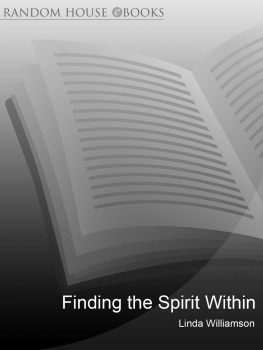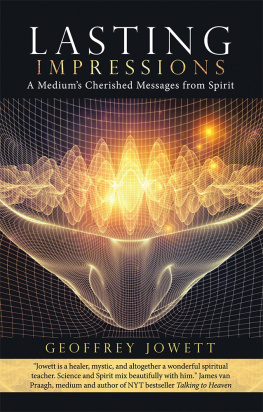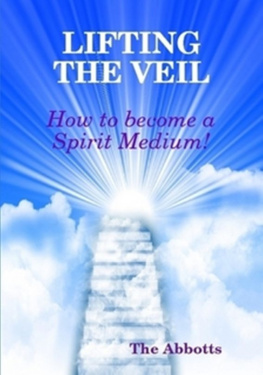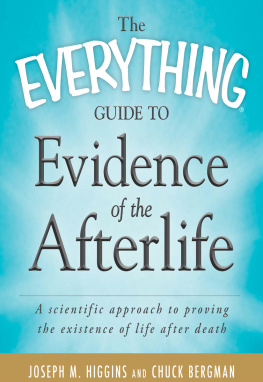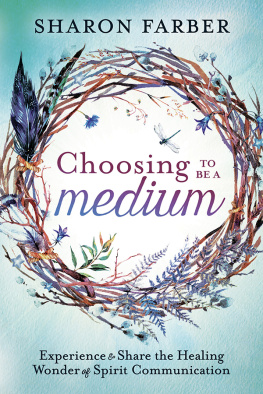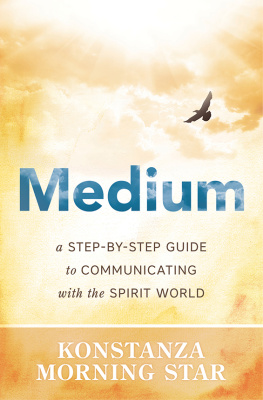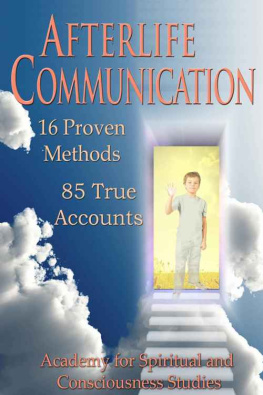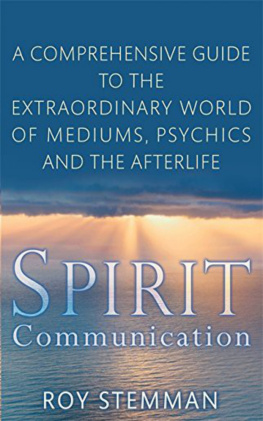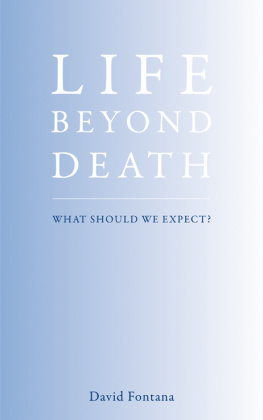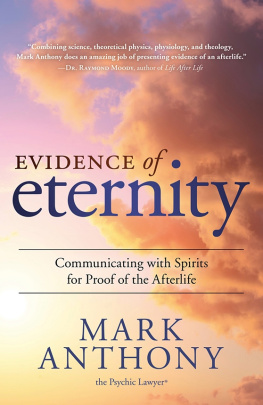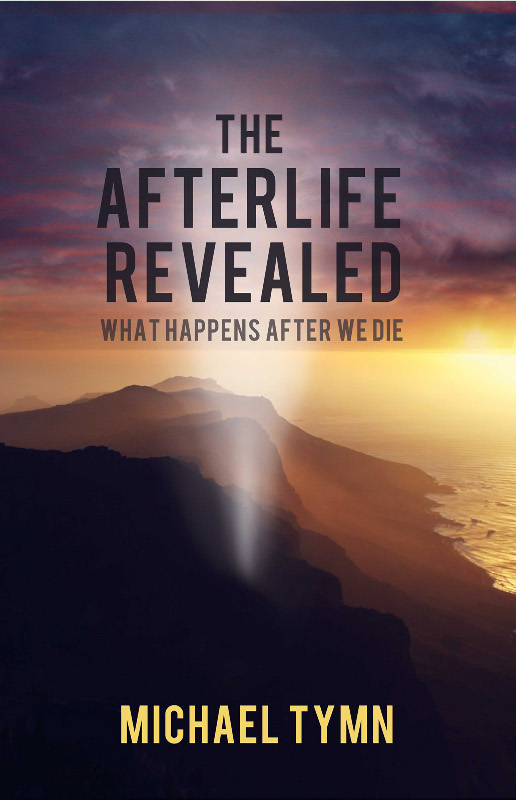
The Afterlife Revealed
What Happens After We die
Copyright 2011 by Michael E. Tymn. All rights reserved.
Published and printed in the United States of America and the United Kingdom by White Crow Books; an imprint of White Crow Productions Ltd.
No part of this book may be reproduced, copied or used in any form or manner whatsoever without written permission, except in the case of brief quotations in reviews and critical articles.
For information, contact White Crow Books at P. O. Box 1013 Guildford, GU1 9EJ United Kingdom, or e-mail to .
Cover designed by Butterflyeffect
Book designed by Perseus Design
Produced by essentialworks.co.uk
Paperback ISBN 978-1-907661-90-7
eBook ISBN 978-1-907661-91-4
New Age/Metaphysical/Religion
Published by White Crow Books
www.whitecrowbooks.com
Disclaimer: White Crow Productions Ltd. and its directors, employees, distributors, retailers, wholesalers and assignees disclaim any liability or responsibility for the authors statements, words, ideas, criticisms or observations. White Crow Productions Ltd. assumes no responsibility for errors, inaccuracies, or omissions.
THE AFTERLIFE REVEALED
WHAT HAPPENS AFTER WE DIE
A man should be able to say he has done his best to form a conception of life after death, or to create some image of it even if he must confess his failure. Not to have done so is a vital loss.
C. G. Jung
M ichael Tymn is one of the worlds foremost living experts on afterlife studies. His earlier book The Articulate Dead, a study of apparent spirit accounts reaching us through mediums, presented evidence in support of the spirit hypothesis. He concluded that the best of these accounts could not have been inventions of the subconscious mind of the medium, for they contain a great deal of information, later confirmed to be true, unknown to the medium. But this same information was well known, in earth life, to the person whose spirit was said to be communicating through the medium. Tymn is a master of this evidential approach used to evaluate spirit communications. There is perhaps no one living today who has dissected so many of them and argued so successfully for their authenticity. This method of analysis, it seems to me, makes it close to certain that we survive our physical death and enter another world as spirits with memories, personality, and character intact.
In this new book Tymn takes the next step. It is one thing to argue for the reality of life after death, but quite another to picture it. That is exactly what Tymn does here. Quite a bit of the book is taken up with repeating the earlier arguments for survival of death and that is a strength of the present book but then he ventures farther out. If you are wondering how an earthling can go about this, the answer is obvious on second thought. If we can show that a spirit communicating to us through a medium accurately recalls detailed information that his loved ones and friends later confirm, then there is good reason to take him at his word when he describes his experiences on the Other Side. If only a few spirits were capable of such feats, we would be wise to be on our guard. But when hundreds of voices, even thousands, coming to us through mediums from all over the world repeat much the same story, we should be impressed. What makes Tymn stand out among afterlife researchers is his perhaps uniquely vast knowledge of mediumistic sources. It is hard to believe that these sources, when assembled and collated, reveal nothing more than an enchanting chimera.
As a result, you are likely to come away from reading this book feeling that you have at least a general idea of what to expect when you die. And that can be quite sobering, as Tymn intends it to be. Nothing stands out with greater clarity than this: We all of us are accountable for what we do on earth, for better or worse. The justice that we all seek in this world, but seldom find as we would like it, at last has its day. The universe revealed by spirits comes across as a vast moral gymnasium, with character development, or soul growth, the Creators top priority. How this all works out, and the otherworldly settings for its evolution, are the focus of this fascinating book.
But this is not a book only about the afterlife. If you want to know what is expected of you in this life, then you would be wise to consult those intelligences closer to the Divine Source than we are. They are far from infallible, as they admit, but their point of view is inspiring and revitalizing. To anyone clueless about what life expects of us or horrified by the thought of death, this book could be life-changing here and now.
Abraham Lincoln worked relentlessly to show young America that democracy at its best far surpassed any other form of government that the world had seen. His aim was to spread human happiness among the masses former slaves, immigrants, Catholics, Jews. The spirits surveyed here are inspired by something similar. They hope, from their superior vantage point, to guide the great mass of drifting, purposeless humanity toward a goal worthy of their native splendor. Ever since I have known him, Michael Tymn has regretted that the wisdom of the spirits seemed to have been lost to the world. This book is his humble gift to it. May you be helped to discover your native splendor within its pages.
Stafford Betty, Ph.D.
Professor of Religious Studies
California State University, Bakersfield
Author of The Afterlife Unveiled
When a man is seventy-five he cannot help sometimes thinking about death. The thought of it leaves me perfectly calm, for I am convinced that our spirit is absolutely indestructibleit is like the sun which only seems to sink and in reality never sinks at all.
Goethe
A s I complete this book by fine-tuning the rough draft and rewriting the first paragraph of this Preface, I am into my 75th year and currently afflicted with a mysterious blood clot in my right leg one that, Im told, could fragment and travel to my heart, lungs, or brain, ending my life. Im in no particular hurry to leave this realm of existence and am very much concerned about leaving my wife alone. Im also concerned about the possibility of surviving a stroke with diminished capacities. Nor does the pain connected with an embolism, heart attack, or stroke particularly appeal to me. But, all those concerns aside, I think I can honestly say I do not significantly fear the idea of death itself. In fact, I find it somewhat exciting.
Many friends and relatives who know of my interest in death and afterlife research express concern that it is an unhealthy or taboo subject matter. One life at a time for me is a typical reaction, a subtle and supposedly intelligent way of saying that the person is not interested in discussing anything related to death.
I respond to that comment by saying that I agree that we should be living in the present, not looking ahead to some distant afterlife. But I add that the best way to live in the present, or in the now, or in the moment, is to live in eternity. That always brings puzzled expressions and requires some explanation. I begin by calling upon some great thinkers. As examples, the eminent Swiss psychiatrist Carl Jung said that it is psychologically beneficial to have death as a goal toward which to strive. Mozart called death the key to unlocking the door to true happiness. Shakespeare wrote that when we are prepared for death, life is sweeter. The French philosopher Michel de Montaigne said that to practice death is to practice freedom. Essentially, what they all say is that in understanding death, in embracing death, we come to understand life and better enjoy it.



